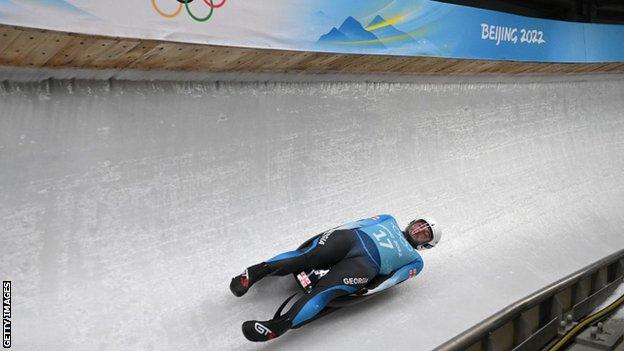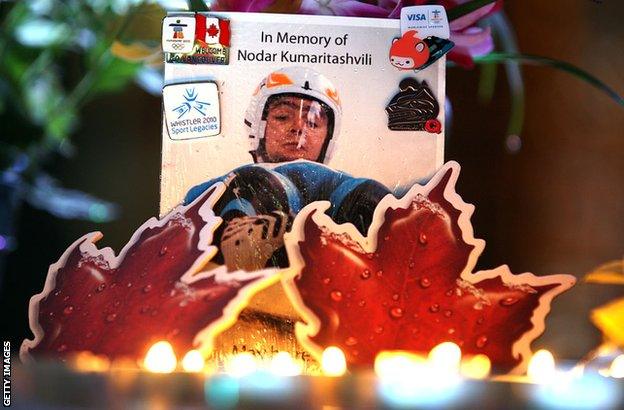Winter Olympics: Georgian luger's dream fulfilled by cousin 12 years after tragedy
- Published

Saba Kumaritashvili has carried on his late cousin Nodar's Olympic dream
24th Winter Olympic Games |
|---|
Hosts: Beijing, China Dates: 4-20 February |
Coverage: Watch live on BBC TV, BBC iPlayer, BBC Red Button and online; listen on BBC Radio 5 Live and BBC Sounds; live text and highlights on BBC Sport website and mobile app |
"May you carry his Olympic dream on your shoulders and compete with his spirit in your heart."
Those were the words the grieving athletes heard at the opening ceremony of the 2010 Winter Games after Georgian luger Nodar Kumaritashvili died in a training crash just hours earlier.
They could also have been directed at his then nine-year-old cousin Saba.
Now 21, Saba has become the first Georgian luger to compete at an Olympics at Beijing 2022.
He said: "I think about Nodar. I think about him all the time. Everyone in my family is in luge. After Nodar, I didn't want luge to die in Georgia. I wanted to keep it going."
His cousin would have held that honour had it not been for the events that plunged the Games into grief and reminded the world of the dangers of a sport in which an athlete travels down an icy track at speeds of more than 85mph on a tiny sled wearing a skin-tight suit and a helmet.
Saba is the same age as Nodar was when he was killed when his sled flipped and he smashed into a steel pole at the Whistler Sliding Centre.
His sled had struck the inside of the track's last turn during his sixth and final training run, sending him into the air and over a concrete wall.
For many people it would have been understandable for the Kumaritashvili family to never go near luge again.
But it is in their blood.
Saba's great grandfather oversaw the building of Georgia's first luge training track half a century ago and also served as head coach. His father served as president of the country's luge federation, and his cousin is now in that role.
"The entire Kumaritashvili family always was and still is very passionate for luge," executive director of the International Luge Federation (FIL), Christoph Schweiger, told BBC Sport.
"I personally never heard one single word from whomever within the Kumaritashvili family that they are done with luge - that they don't want to be part of it anymore. I think that says a lot..."
Saba was in 31st place after Saturday's opening two runs at the Yanqing sliding centre, but his participation was about much more than numbers.
I'm very happy," he said. "I've done what I needed. I was emotional, I was so nervous, but I feel very proud of myself."
Hosts China win their first gold of Games in short track mixed team relay
'Tragic accident' that changed luge

There was an outpouring of grief at the Vancouver Games, and local organising committee chief John Furlong, told athletes at the opening ceremony: "May you carry his Olympic dream on your shoulders and compete with his spirit in your heart"
Those who were there at the time remember the horror of what happened and how it changed the sport forever.
Schweiger, an Austrian former luger before his role at the FIL, was in the finish outrun and witnessed the crash on the TV monitors.
"We all noticed immediately that something really bad just happened," he said.
Onlookers gasped in horror and officials quickly switched off the television monitors.
"This accident was a severe shock for the entire luge family," Schweiger added. "We are not used to dealing with such dramatic accidents."
An investigation followed and the FIL introduced more restrictions for being eligible to compete at Olympics, such as having to do a certain number of runs at the Olympic track and mandatory competitions, as well as a minimum number of World Cup points that athletes need to earn.
"The investigation came to the conclusion that this was a tragic accident, which couldn't be expected in advance," Schweiger said.
"It might sound a bit strange in this context: A race sport where you have to wear a helmet, always has a certain risk you have to be aware of."
It is a risk Saba has embraced to carry Nodar's Olympic dream on his shoulders.